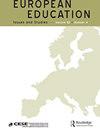Anti-Ethnic Hegemony, Identity Construction and Political Complicities
IF 0.9
Q4 EDUCATION & EDUCATIONAL RESEARCH
引用次数: 4
Abstract
Abstract Teaching material and textbooks undoubtedly operate politically and should be scrutinized concerning the knowledge that they construct and legitimize. But such scrutiny often involves new hegemonies and political complicities that also require further scrutiny. Following Ernesto Laclau and Chantal Mouffe’s discourse analysis the present article critiques one such hegemony: that which sets civic identity against ethnic identity and, to prioritize the former, depoliticizes or even effaces the latter. To illustrate the need for further scrutiny of such politics the article carries out a deconstructive reading of a text (that of Yannis Papadakis, 2008) that is representative of this hegemony. This reading reveals that Papadakis tacitly blames ethnic identity as such for the wrongful treatment of Otherness, thus incriminating ethnic attachment wholesale and, therefore the very Otherness in whose name he purportedly deploys his social constructionism. I argue that Papadakis’ modernist suggestion to disconnect the present from the historical past undermines ethnicity while failing to stave off essentialist and racial understandings of it. At cross-purposes with social constructionism, Papadakis’ critique of the pernicious political operations of ethnic identities ends up annihilating ethnic identities.反民族霸权、身份建构与政治共谋
教材和教科书无疑是在政治上运作的,它们所建构和合法化的知识应该受到审视。但这种审视往往涉及新的霸权和政治共谋,这也需要进一步审视。本文继埃内斯托·拉克劳和尚塔尔·墨菲的话语分析之后,批判了这样一种霸权:它将公民认同与种族认同对立起来,为了优先考虑前者,将后者去政治化,甚至抹去。为了说明对这种政治进行进一步审查的必要性,本文对代表这种霸权的文本(Yannis Papadakis, 2008)进行了解构性解读。这一解读揭示了帕帕达基斯心照不传地将种族认同归咎于对他者的错误对待,从而将种族依恋全盘归罪于他者,因此,他以他者的名义,据称是在运用他者的社会建构主义。我认为,帕帕达基斯的现代主义建议将现在与历史分离开来,这破坏了种族主义,同时未能避免本质主义和种族主义对种族主义的理解。帕帕达基斯对种族认同的有害政治运作的批判,与社会建构主义的目的相反,最终消灭了种族认同。
本文章由计算机程序翻译,如有差异,请以英文原文为准。
求助全文
约1分钟内获得全文
求助全文
来源期刊

European Education
EDUCATION & EDUCATIONAL RESEARCH-
CiteScore
1.20
自引率
0.00%
发文量
5
期刊介绍:
uropean Education is published in association with the Comparative Education Society in Europe (CESE). It is an international peer-reviewed journal devoted to original inquiries and dialogue on education across the member states of the Council of Europe. Established in 1969, the journal features articles on education in individual member states, comparative studies on education across Europe, as well as the impact of European education initiatives globally. The journal especially encourages theoretical and empirical studies, interdisciplinary perspectives, and critical examination of the impact of political, economic, and social forces on education. European Education includes reviews of books and educational films, including those published/produced in English and other languages.
 求助内容:
求助内容: 应助结果提醒方式:
应助结果提醒方式:


